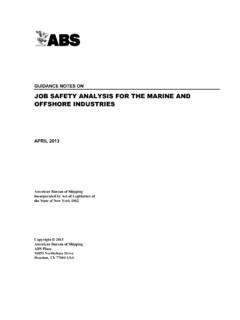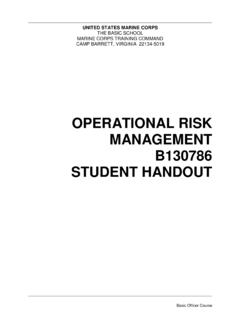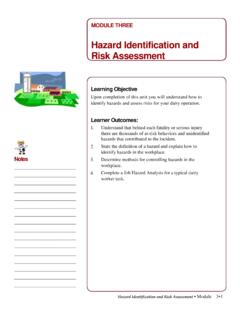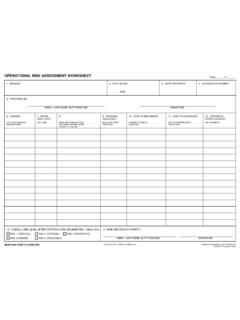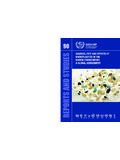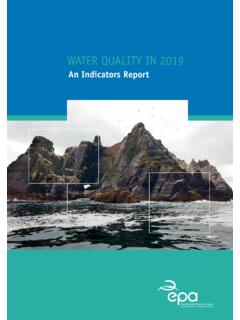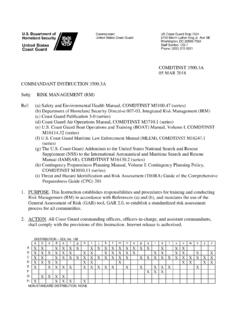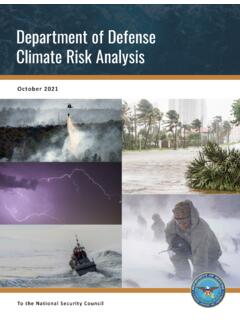Transcription of Climate Change Risk Assessment for the Insurance Industry
1 February 2021 Climate Change Risk Assessment for the Insurance IndustryA holistic decision-making framework and key considerations for both sides of the balance sheet 1 Climate Change Risk Assessment for the Insurance IndustryThe Geneva Association Task Force on Climate Change Risk Assessment for the Insurance IndustryMaryam Golnaraghi (project leader and coordinating author), The Geneva AssociationDrafting team:Ian Adamczyk, Moya Chew-Lai (retired), Li Liu, Sean Collins, Prudential FinancialHj rtur Thrainsson, Munich ReMich le Lacroix, Paul Nunn, SCORM artin Bertogg, Swiss ReOther team members:Gijs Kloek, Achmea | Pedro Nascimento de Oliveira, AegonJennifer Waldner, David Buckle, Anthony L Zobl, AIG Sebastian Fischer, Allianz | Ben Carr, Bianca Hanscombe, Jean-Francois Coppenolle, Aviva Dora Elamri, Olivier Poissonneau, Helene Chauvea, AXA | Gloria Jimenez, Alex Speers, Chubb Hidenao Makiuchi, Kazumi Hayashi, Dai-ichi Life | J rg Steffensen, Hannover Re Brandon Blant, Mandy Dennison, Pierre Bernard, Laura Willett, Intact FinancialCindy Forbes, Margaret Eve Childe, Maria McGowan, Herman Ko, Manulife Diana Keegan, Anna Warm, MetLife | Eberhard Faust (retired), Munich Re Junaid Seria, Yun Wai-Song, SCOR | Martin Weymann, Swiss ReZ.
2 Ming Li, John Campbell, Kei Kato, Tokio Marine | Dennis Noordhoek, The Geneva AssociationClimate Change Risk Assessment for the Insurance IndustryA holistic decision-making framework and key considerations for both sides of the balance sheet Geneva AssociationThe Geneva Association was created in 1973 and is the only global association of Insurance companies; our members are Insurance and reinsurance Chief Executive Officers (CEOs). Based on rigorous research conducted in collaboration with our members, academic institutions and multilateral organisations, our mission is to identify and investigate key trends that are likely to shape or impact the Insurance Industry in the future, highlighting what is at stake for the Industry ; develop recommendations for the Industry and for policymakers; provide a platform to our members, policymakers, academics, multilateral and non-governmental organisations to discuss these trends and recommendations.
3 Reach out to global opinion leaders and influential organisations to highlight the positive contributions of Insurance to better understanding risks and to building resilient and prosperous economies and societies, and thus a more sustainable Task Force would like to thank the members of the Geneva Association Climate Change and Emerging Environmental Topics Working Group and the Public Policy and Regulation Working Group for their review and feedback. We extend our special thanks also to: Chris Boss and Maeve Sherry (Aviva); Liesbeth van der Kruit and Gijs Kloek (Achmea); Edward Barron (AIG); Simone Ruiz-Vergote and Andreas Funke (Allianz); Patricia Plas, Celine Soubranne and Madeleine-Sophie Deroche (AXA); Laura Willet (Intact Financial); Hidehiko Sogano and Jiro Kamiko (Dai-ichi Life); Diana Keegan (MetLife); Panos Charissiadis (Munich Re); Guillaume Ominetti (SCOR); Urs Halbeisen and Marion Lienhard, Stefan Roth, Tobias Wassmann, Lutz Wilhelmy (Swiss Re).
4 Finally, we appreciate the helpful comments of Christophe Courbage and Kai-Uwe Schanz (The Geneva Association). Geneva Association publications:Pamela Corn, Director CommunicationsHannah Dean, Editor and Content ManagerPetr Neugebauer, Digital Media Manager Suggested citation: The Geneva Association. 2021. Climate Change Risk Assessment for the Insurance Industry . February. Authors: Maryam Golnaraghi and the Geneva Association Task Force on Climate Change Risk Assessment for the Insurance Industry . The Geneva Association, 2021 All rights credits: Cover page Elena11 and Fit Ztudio / Change Risk Assessment for the Insurance IndustryContents Foreword 51. Executive summary 62. Context 103.
5 Terminology 134. How does Climate Change impact the Insurance Industry ? Framing Climate Change risks and relevant time horizons for decision-making Implications of Climate Change risk for P&C and life re/insurers Liability side 18 P&C re/insurers 18 Physical risk 19 Transition risk 20 Life re/insurers 22 Physical risk over the short term 22 Transition risk over the short term 22 Physical and transition risk over the long term Implications of Climate Change risk for P&C and life re/insurers Asset side 23 Physical risk 23 Transition risk Key questions re/insurers ask when embarking on Climate Change risk assessments 245. Approaches to Climate Change risk Assessment Quantitative tools Qualitative tools 276.
6 Summary and conclusions 28 References 30 Annexes Annex 1: Climate Change -related activities of regulatory authorities 33 Annex 2: P&C and life Insurance business models Financial Stability Board s (FSB) Task Force on Climate -Related Financial Disclosure (TCFD) has raised the need for decision-relevant, clear, consistent and comparable Climate information for stakeholder groups to inform investing. The Insurance Industry is well positioned to take the lead in advancing the forefront of methodologies and tools that produce meaningful and decision-useful information: risk is the raison d tre of the Industry , and risk Assessment is already deeply embedded in companies' risk management, underwriting and investment processes.
7 Building on a history of physical Climate risk modelling, and through the platform of The Geneva Association, the insur-ance Industry is taking steps to strengthen further its global collaboration across P&C and life re/insurers to advance methodologies and tools for Climate risk Assessment and scenario analysis for both sides of the balance sheet. This report the first in a series of three offers a holistic decision-making framework for P&C and life re/insurers, for both the liability and asset sides of the balance sheet, taking into consideration all aspects of Climate Change risk ( physical and transition risks ) by line of business (LoB) and over distinct time horizons. This analysis offers a foundation for the Geneva Association Task Force s work to drive future developments in this , the effects of Climate Change are becoming more palpable and harder to ignore.
8 Persistently warming temperatures and sea-level rise. Compromised ocean ecosystems. Gigantic wildfires in Australia and California and a record hurricane season in the Atlantic. The societal impacts are worldwide, and individuals and institutions must fully commit now to confronting the Climate their part, insurers are already contributing significantly to the transition to a low-carbon economy. On the liabilities side, more insurers are factoring Climate risk into their underwriting decisions. On the asset side, many companies have investment strategies that support Climate mitigation. An important next step is to develop and hone Climate risk Assessment methodologies and are many calls for collaboration within and across industries to tackle this.
9 And that is precisely the aim of the Geneva Association task force: to bring the global Insurance Industry to the same table to develop effective approaches to Climate risk Assessment . However, working in Industry silos is not enough. Cooperation with regulators, rating agencies, and the scientific community is critical to deciding the most viable ways forward. Our initiative is closely engaging those stakeholders as first report of the task force sets out a Climate risk Assessment framework for both P&C and life insurers, urging companies to start with a simplified approach. They should focus on two time horizons short term (2020 2030) and long term (2030 2050) and the potential implications of physical and transition risks for both sides of the balance sheet.
10 As underwriters, insurers are at the forefront of understanding and preventing risk. As asset managers, they can steer massive amounts of capital to Climate -resilient investments. Insurers are obvious, strong leaders on global Climate action, and our Industry -led initiative reinforces that they are willing and eager to forge ArissManaging DirectorForeword5 Climate Change Risk Assessment for the Insurance is now widespread global recognition of Climate Change science and the associated socio-economic impacts as set out by the United Nations Intergovernmental Panel on Climate Change (IPCC).1 While governments have submitted their Nationally Determined Contributions (NDCs) to mitigate the impacts of Climate Change ,2 the development of public policies for an orderly transition to a low-carbon future has been stubbornly slow.
